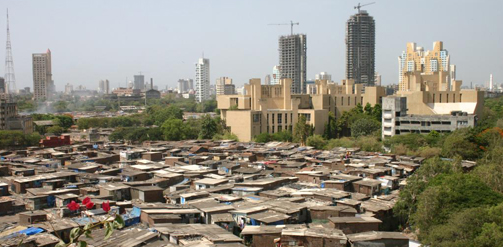In academic and policy arenas, urbanisation and cities are currently receiving a great deal of attention, and rightly so. Both have been central to the enormous transformation the world has been going through during the past few centuries. Cities can drive economic growth and foster human wellbeing but can also, sometimes simultaneously, heighten inequality and extreme poverty. The latter is particularly evident in cities where substandard housing, insecure and hazardous work, environmental degradation and civic unrest have become endemic. Another way to illustrate this duality is to juxtapose several macro statistics: cities only occupy 2 per cent of total habitable land, but at the same time, account for nearly 70 per cent of global GDP, over 60 per cent of global energy consumption, nearly 70 per cent of greenhouse gas emissions, and 70 per cent of global waste.

Image credit: Mumbai Nehru Centre. Builders at work. Slums below. By Sthitaprajna Jena
Habitat III and the New Urban Agenda
This time last year, delegations from across the world were preparing for the Habitat III Conference in Quito, the bi-decadal international gathering on urban issues convened by the United Nations. Representatives from a wide range of nations, municipalities, donors, communities of the urban poor, profit and non-profit organisations and academic bodies convened to debate and share the latest insights into development in and of cities. (Read more about our own insights and how we engaged with Habitat III).
A key outcome of the Habitat III Conference was the drafting and successful adoption of a set of principles and commitments that will guide the efforts around urbanization and urban development of a wide range of actors — nation states, city and regional leaders, international development funders, United Nations programmes and civil society — for the next 20 years. Called the ‘New Urban Agenda’, the principles and commitments set out a broad vision for more inclusive, secure and sustainable cities in the 21st century. While non-binding, the New Urban Agenda has galvanised attention to key urban development issues, explicitly adopting a universal framing to highlight the shared challenges facing towns and cities in low, middle and high income countries and the opportunities for learning across these.
Linkages between urbanisation, inequalities, security and sustainability
Understanding and managing urbanisation in developing countries is a major global policy challenge for the twenty-first century. Through our research with partners and in-depth analysis of the complex links between urbanisation, inequalities, security and sustainability, we are critically informing policy and practice.
We believe that as pro-urban voices become louder, accounts of the wonders of cities need to be balanced with a recognition of the violence, inequity and environmentally destructive forces that cities can embody and reproduce. Running through Urban October, our curated blog series draws on recent research by members of the IDS Cities Cluster to present some reflections on key themes in the New Urban Agenda such as: affordable housing; homelessness; urban refugees and wellbeing; and safer cities. We showcase a range of examples from the Middle East and Northern Africa (e.g. Gaza city, Beirut); East Africa (e.g. Dar); South and East Asia (e.g. Mumbai, Gen Santos, Zambuanga); Latin America (e.g. Guadalajara) to reflect on the urban transitions that the world is going through.
On World Habitat Day (Monday 2 October) IDS Fellow Jaideep Gupte opens the blog series with a comment piece on the crisis of affordable housing. Sign up (in the link on the right-hand side) to follow our blog series.